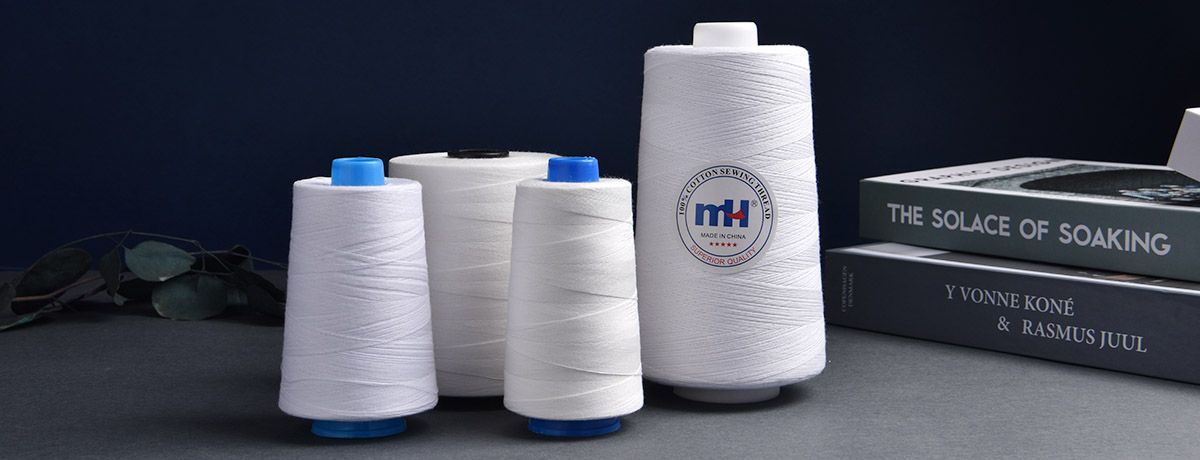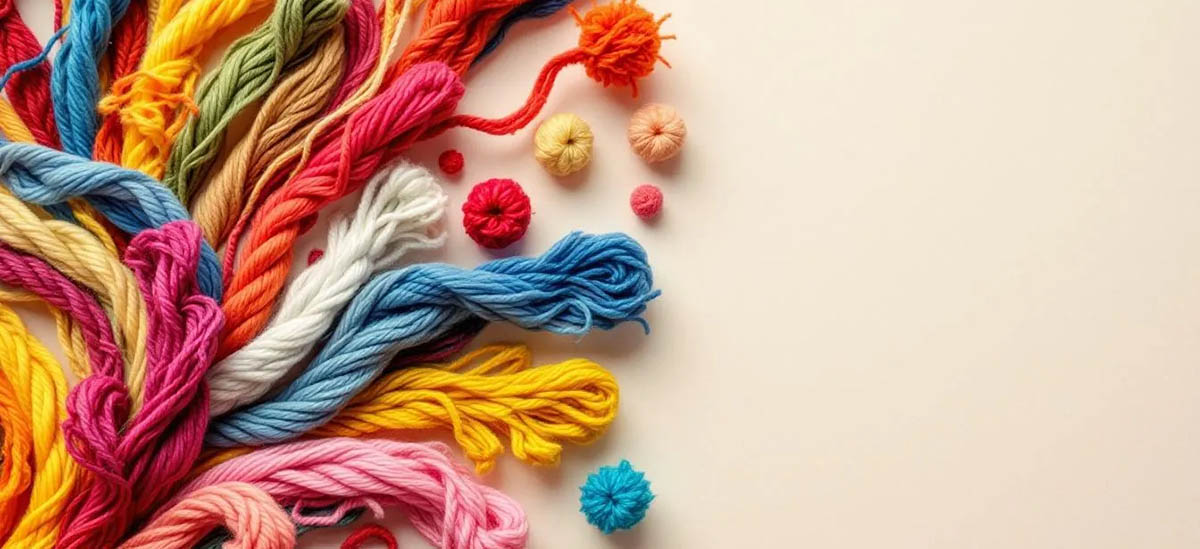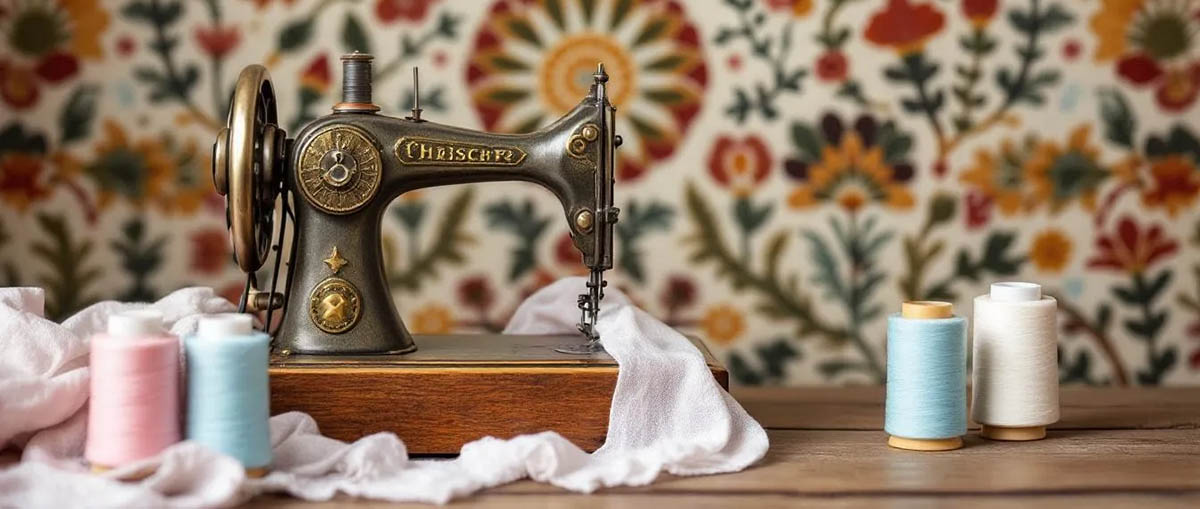Top Quality Cotton Threads for Sewing - Find Your Perfect Spool

- Key Takeaways
- Discover the Variety of Cotton Threads
- Cotton Thread Colors and Sizes
- Hand Sewing with Cotton Threads
- Machine Sewing with Cotton Threads
- Bobbin Thread Options
- Cotton Threads for Quilting
- Embroidery with Cotton Threads
- Care and Maintenance of Cotton Threads
- Wholesale Cotton Sewing Threads
- Summary
- Frequently Asked Questions
- What are the benefits of using long staple cotton threads?
- How do I choose the right thread color and size for my project?
- What needle size should I use with 50-weight cotton thread in a sewing machine?
- Why should I consider buying cotton threads wholesale?
- How should I store my cotton threads to ensure their longevity?
Want to know why cotton threads are a top choice for sewing? This guide explores their types, benefits, and how to use them effectively in your projects.
Key Takeaways
-
Cotton threads come in various types and blends, impacting their performance, durability, and suitability for specific sewing projects.
-
The color, size, and weight of cotton threads are crucial for achieving optimal results in both hand and machine sewing, while organic options cater to environmentally conscious consumers.
-
Choosing the right bobbin thread, maintaining sewing machines, and bulk purchasing can enhance the sewing experience, ensuring efficiency and cost-effectiveness.
Discover the Variety of Cotton Threads
Cotton threads come in a dazzling array of types, each designed to meet specific sewing needs. The quality of the cotton fiber significantly impacts the thread’s performance. Long staple cotton fibers, for instance, are celebrated for their strength and smoothness, making them ideal for high-speed sewing. Premium long-staple cottons, such as Pima and Egyptian cotton, are known for their enhanced softness and durability, ensuring that your projects stand the test of time.
Another important consideration is the blend of the thread:
-
Pure cotton threads offer a natural feel that is unmatched.
-
Cotton/polyester blends are often more affordable and durable.
-
These blends may not provide the same soft touch as pure cotton, but they bring their own advantages, particularly in terms of cost-effectiveness and strength, especially when considering natural fibers.
Knowing the different types of cotton threads available helps you choose the right thread for your sewing projects. From long staple cottons to versatile cotton/polyester blends, each type has its unique benefits and applications.
Cotton Thread Colors and Sizes

Color and size are as crucial as the type of fiber in cotton threads. Cotton threads are available in a wide range of weights and sizes, each suited for different types of projects and stitching techniques. For example, 40 and 50 weight threads are commonly used for quilting due to their versatility and ability to meet various project requirements.
Perle cotton is another popular choice, with the following characteristics:
-
Sizes range from 3 to 12, with higher number indicating finer threads.
-
These sizes allow for intricate detailing in embroidery and other delicate sewing projects.
-
Some threads are mercerized, giving them a sheen that enhances their appearance and contributes to the overall look of the finished piece.
For those who are environmentally conscious, organic cotton threads produced without chemical pesticides are an excellent option. The right thread color and size can greatly influence your sewing project’s outcome, making your stitches both functional and visually appealing in a great environment and style.
Hand Sewing with Cotton Threads
Hand sewing with cotton threads offers a level of flexibility and ease of handling that is hard to match. The softness of cotton threads makes them a favorite for delicate projects, allowing for smooth and precise stitches. Whether you’re working on a quilt, a piece of embroidery, or a simple repair, cotton thread can simplify the process and make your work more enjoyable.
Using the right weight of cotton thread is key to achieving the desired results in hand sewing. Thread weight greatly affects the design and durability of your project. For example, heavier threads add texture and dimension to quilting, while finer threads create stronger, delicate, intricate patterns.
Hand sewing with cotton threads is also about the experience, not just the technical aspects. The easy natural feel of cotton threads makes the sewing process more enjoyable, allowing full immersion in your love crafts.
Machine Sewing with Cotton Threads

Following a few key guidelines can make machine sewing with cotton threads a seamless experience. Using a 50-weight cotton thread, for instance, pairs well with a needle size of 80/12 to prevent wear on both the fabric and the thread. Ensuring that your sewing machine is threaded with the presser foot lifted can help the thread seat properly in the tension discs, preventing issues like tangling.
Adjusting the upper thread tension helps avoid loops on the underside of the fabric. Regularly clean your sewing machine because cotton threads produce more lint than synthetic ones. This maintenance helps in keeping your machine in optimal working condition and ensures smooth sewing sessions.
Improved thread feeding efficiency, especially with cross-wound king spools, can be achieved by using horizontal spool placement or a separate thread stand. If you encounter thread breakage, check the needle size; using too small a needle can stress the cotton thread and lead to breakage. Following these tips ensures a smooth and efficient sewing experience with cotton threads.
Bobbin Thread Options
Choosing the right bobbin thread is crucial to the overall sewing process and can make a significant difference. Pre-wound bobbins save you the time and effort of manual winding, offering a convenient option. These pre-wound bobbins are available in various sizes, including Class 15 and Class L, making them suitable for different sewing machine models.
Material options for bobbin threads include both cotton and polyester, providing flexibility for various sewing applications. Having the right bobbin thread options, whether for everyday or specialized projects, enhances your sewing experience and ensures better results.
Cotton Threads for Quilting
Quilters favor cotton threads for several reasons:
-
Strength and durability, especially with natural fiber fabrics like cotton
-
Help minimize fabric shrinkage and fraying, contributing to the longevity of quilting projects
-
Smooth finish and minimal lint production, making cotton threads enjoyable and efficient to use
Brands like Mettler and Aurifil are renowned for their high-quality cotton threads. Mettler’s 50-weight cotton thread, known for its superior quality, is ideal for both sewing and quilting. Aurifil’s 50wt thread is favored for its fine texture and ability to create flat seams, enhancing quilts’ overall appearance.
The matte finish of cotton threads complements the look of cotton fabrics, creating a perfect cohesive appearance in quilts. Specific types of cotton threads are designed for particular sewing tasks, ensuring the best results for your quilting projects.
Embroidery with Cotton Threads
Embroidery with cotton threads necessitates understanding:
-
Thread thickness and twist tightness to achieve the desired appearance.
-
Thread weight, which affects stitch size and visual texture, making it important to choose the right one for your project.
-
Tighter twists, which generally produce smoother, thicker, more structured stitches that can enhance the overall look of your embroidery.
For machine embroidery, use a size 75/11 needle with standard 50wt cotton thread for clean, precise stitching. Brands like MH offer a wide variety of over 400 colors, including solid shades and specialty threads, making them suitable for diverse embroidery projects. Selecting the right thread and needles combination ensures your embroidery looks professional and polished.
Care and Maintenance of Cotton Threads
Proper care and maintenance prolong the life of your cotton threads and keep them in top condition. Store threads in a cool, dry place away from direct sunlight to prevent fading and deterioration. Moisture can lead to issues like mildew and degradation, so it’s important to keep threads dry.
Using a damp sponge in the storage container can help maintain the right humidity levels for washed cotton threads. Following these simple washing storage tips ensures your threads remain vibrant and strong, ready for your next sewing project.
Wholesale Cotton Sewing Threads
Buying cotton sewing threads in bulk is a cost-effective option for many businesses. Benefits include:
-
Wholesale price offers significant savings, making it more affordable to stock up on essential supplies.
-
Many wholesalers offer tiered pricing, meaning the more you buy, the better the rates you receive.
-
This can greatly enhance profit margins for businesses.
Another advantage of buying wholesale is access to specialty threads that are not typically available in retail stores. A good relationship with suppliers can lead to more favorable terms, such as lower minimum order quantities and better pricing. Some suppliers also offer custom quotes and flexible payment terms, making wholesale purchasing more accessible for small businesses.
By sourcing from reliable wholesalers in India, businesses can ensure consistent quality in their secure cotton threads review, where they can find vital information for maintaining product standards and customer satisfaction with their customers’ products.
Summary
In summary, choosing the right cotton thread for your sewing projects can make a world of difference. Understanding the variety of threads available, their colors, sizes, and specific applications for hand and machine sewing, quilting, and embroidery can elevate your work to new heights. Proper care and maintenance will ensure your threads remain in prime condition.
By considering wholesale options, you can also make your sewing endeavors more cost-effective. With the knowledge gained from this post, you’re now equipped to find the perfect spool for any project, crafting with confidence and creativity.
Frequently Asked Questions
What are the benefits of using long staple cotton threads?
Using long staple cotton threads enhances the strength and smoothness of your sewing projects, resulting in increased durability and a softer finish. This makes them particularly suitable for high-speed sewing applications.
How do I choose the right thread color and size for my project?
To choose the right thread color and size, assess your project's requirements: opt for finer threads for delicate work and heavier threads for texture. Additionally, consider color harmony with your materials and any personal or environmental preferences you may have.
What needle size should I use with 50-weight cotton thread in a sewing machine?
Using an 80/12 needle size is best for 50-weight cotton thread, as it balances the needs of the fabric and thread, ensuring smooth sewing without causing damage.
Why should I consider buying cotton threads wholesale?
Consider buying cotton threads wholesale to reduce costs and access specialty threads that can enhance your product offerings and profit margins. This approach can significantly benefit your business.
How should I store my cotton threads to ensure their longevity?
To ensure the longevity of your cotton threads, store them in a cool, dry place away from direct sunlight and moisture. Utilizing a damp sponge in your storage container can help maintain optimal humidity levels.
